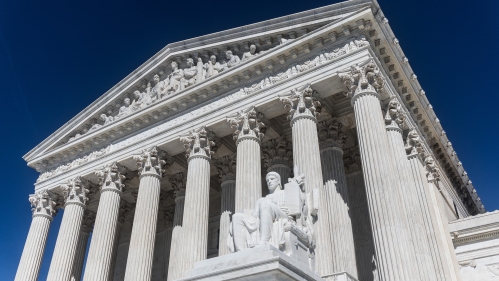
Adam Crews
Assistant Professor of Law

Legal Issues to Watch in 2025
Major legal changes were expected in 2025 with all branches of government, including the U.S. Supreme Court, holding a conservative majority. Rutgers Law professors weighed in on cases and laws expected to make headlines and reshape the legal landscape at the start of the new year. Explore their analyses and see how those cases were decided.
Click the an image or title to learn more about each topic.

Adam Crews
Assistant Professor of Law

Rose Cuison-Villazor
Professor of Law

Katie Eyer
Professor of Law

Jessica Frisina
Assistant Professor of Law

Ellen P. Goodman
Distinguished Professor of Law

Camila Hrdy
Associate Professor of Law

JC Lore III
Distinguished Clinical Professor

Randi Mandelbaum
Professor of Law. Associate Dean for Clinical Education (Newark)

Sarah Ricks
Distinguished Clinical Professor

David D. Troutt
Distinguished Professor of Law

Reid Kress Weisbord
Distinguished Professor of Law
Nondelegation Doctrine
Assistant Professor Adam Crews: In our complex modern society, Congress relies heavily on administrative agencies to solve increasingly complicated policy problems using delegated authority. Under the so-called “nondelegation doctrine,” however, giving too much unguided discretion to an agency can violate the Constitution by handing off legislative power to the executive branch. FCC v. Consumers’ Research raises this kind of challenge to the Federal Communications Commission’s universal service fund, an $8.5 billion annual subsidy program that supports telecommunication services for low-income consumers, schools and libraries, rural healthcare providers, and others living in areas where the cost of building infrastructure is high. Congress has given the FCC broad discretion to build and fund this subsidy program, which is paid for by contributions from service providers like AT&T and Verizon that then pass the costs on to consumers. (Check your monthly phone bill–you likely pay a “Universal Service Fund” charge.) The U.S. Court of Appeals for the Fifth Circuit held the program unconstitutional, agreeing with the challengers that this is essentially a backdoor tax on the American people imposed by the executive branch. If the Supreme Court agrees and gives more teeth to the nondelegation doctrine, it would mark the first time in 90 years that the Court invalidated administrative action on this ground and call into question many other federal regulatory programs. For full disclosure, I’m watching this case closely not only for its broader potential effects on administrative law, but also because I previously served as counsel of record for the FCC in earlier stages of this litigation.
June 27, 2025 decision: "The universal-service contribution scheme does not violate the Constitution’s nondelegation doctrine; Congress sufficiently guided and constrained the discretion that it lodged with the Federal Communications Commission to implement that scheme, and the FCC has retained all decision-making authority within that sphere, relying on the Universal Service Administrative Company only for non-binding advice." (SCOTUS blog) https://www.supremecourt.gov/opinions/24pdf/24-354_0861.pdf


Immigration Law
Professor Rose Cuison-Villazor: Immigration law emerged as a significant issue in the 2024 election and is anticipated to remain a key point in the Trump administration in 2025 and ensuing years. A central focus of President Trump's platform was his promise to pursue mass deportations of millions of undocumented immigrants. This proposed course of action raises a number of legal issues that warrant attention in 2025.
One issue deals with a federalism battle between the federal government and state and local governments and the ability of the U.S. government to condition federal funds on state and local compliance with immigration law. Several states, including California and New Jersey, and cities, including Camden and Newark, have passed laws limiting the sharing of information with immigration authorities to promote trust between the immigrant communities and state and local governments. Critics of these laws, which have been referred to as “sanctuary” laws, contend that they violate federal law, particularly 8 U.S.C. 1373. This law states that a federal, state, or local law “may not prohibit, or in any way restrict, any government entity or official from sending to, or receiving from” the federal immigration agency or officers “information regarding the citizenship or immigration status, lawful or unlawful, of any individual.” President Trump has suggested withholding federal funds from states and cities that adopt such “sanctuary” policies or otherwise refuse to cooperate with federal immigration enforcement.


Capital Punishment
Assistant Professor Jessica Frisina: On October 9, 2024, the Supreme Court heard oral arguments about whether Richard Glossip, who was convicted and sentenced to death for orchestrating the murder of his boss, was entitled to a new trial given that the State of Oklahoma no longer seeks to defend his conviction. The position taken by the State of Oklahoma is an extraordinary twist in this decades-old murder-for-hire mystery. Since his original conviction in 1998, Mr. Glossip has gone through a second trial, lost multiple appeals, lived through nine execution dates, and eaten three last meals. Throughout it all, he has maintained his innocence. In 2022, Gentner Drummond, the newly appointed Attorney General of Oklahoma, reviewed Glossip’s case file and concluded that the State had not only withheld evidence that would have called into question the credibility of its key witness, but also allowed him to lie on the stand. Armed with that information, Attorney General Drummond, an avowed death penalty supporter, joined Mr. Glossip’s request that the Oklahoma Courts grant him a new trial. To his surprise, the Oklahoma Courts denied that request, paving the way for the case to reach the United States Supreme Court. At the oral argument in October, Attorney General Drummond and Glossip argued for the same relief, so the Court appointed Christopher Michel as amicus curiae to argue in support of the judgment below. Given its facts and unusual procedural posture, this case will test the limits of due process, pitting its fundamental protections against the possibility that the lower court’s denial might rest on adequate and independent state law grounds.
February 25, 2025 decision: "The court holds that because the prosecution violated its obligations under Napue v. Illinois, in which the Supreme Court held that prosecutors have a constitutional obligation to correct false testimony, the court reverses the state court's [judgment] and sends the case back for a new trial." (SCOTUS blog) https://www.supremecourt.gov/opinions/24pdf/22-7466_5h25.pdf


Transgender Rights
Professor Katie Eyer: On December 4, 2024, the Supreme Court heard oral argument in the case of United States v. Skrmetti, a challenge to Tennessee’s ban on gender-affirming healthcare for transgender minors. This case is important to watch for a number of reasons. First, and most importantly, it will address a major contemporary controversy around transgender rights: whether absolute bans on gender-affirming care for minors are constitutional. Given the probability of a federal ban on such care (given the results of the November election), the Court’s holding on this issue is one that could have major impacts nationwide. Second, Skrmetti will be the first opportunity for the Supreme Court to weigh in on the equality rights of transgender people under the constitution in any context, so it is likely to also be highly relevant to all other contemporary disputes over transgender rights. Finally, this case will also be one of the first opportunities for the Court’s current conservative majority to articulate its vision of how constitutional equality law should be applied generally. Thus, whatever the Court says in Skrmetti may well have impacts far beyond the context of transgender rights.
June 18, 2025 decision: "Tennessee’s law prohibiting certain medical treatments for transgender minors is not subject to heightened scrutiny under the equal protection clause of the 14th Amendment and satisfies rational basis review." (SCOTUS blog) https://www.supremecourt.gov/opinions/24pdf/23-477_2cp3.pdf


Free Speech
Distinguished Professor Ellen P. Goodman: In 2023, the State of Texas enacted a law requiring each commercial entity that “publishes or distributes material on an Internet website * * * more than one third of which is sexual material harmful to minors” to verify, through certain approved methods, that visitors to the site are at least 18 years old. A district court preliminarily enjoined the law on a facial challenge from purveyors of pornography. It held the law would likely fail strict scrutiny review because it is underinclusive (exempts search engines and social media sites) and overinclusive (what’s offensive to a 13 year old might not be to a 17 year old), as well as unclear (what’s harmful?), and not narrowly tailored (filtering technologies are a less restrictive alternative). The 5th Circuit Court of Appeals vacated (2-1) the injunction on the grounds that rational basis review is the correct level of scrutiny for age-gating pornographic material. The Supreme Court is reviewing the question of whether, in assessing the statute’s constitutionality under the First Amendment, the court of appeals erred by applying rational-basis review rather than strict scrutiny. I’ll be attending to the decision to see how it informs the scope of permissible regulation of communications media.
June 27, 2025 decision: "In a major First Amendment decision, the Supreme Court on Friday upheld a ruling by a federal appeals court that allowed Texas to enforce a state law requiring pornography sites to verify the age of their users before providing access."
(SCOTUS blog) https://www.supremecourt.gov/opinions/24pdf/23-1122_3e04.pdf


FTC’s Noncompete Ban
Associate Professor Camila Hrdy: Last August, a federal judge in Texas permanently enjoined the FTC’s noncompete ban, ruling that the agency exceeded its statutory authority by attempting to ban noncompete agreements nationwide. This decision was not surprising. The FTC’s sweeping ban is swimming against the tide. The vast majority of U.S. states currently permit “reasonable” noncompetes, so long as they are designed to protect “legitimate interests” like trade secrets. However, the FTC’s ban inadvertently placed it at the center of a growing judicial pushback against agency authority. At around the same time as the Texas court was reaching its decision, the U.S. Supreme Court issued two cases reconsidering ‘Chevron deference.” The Texas court cited this new case law to justify its decision to strike down the FTC’s ban. In late October, the FTC appealed the Texas decision to the Fifth Circuit. If the Fifth Circuit affirms the district court’s ruling, which seems likely, the FTC may appeal the case to the Supreme Court. A reversal, which seems unlikely, would almost certainly prompt the plaintiffs to appeal. Either way, the case could reach the Supreme Court as soon as 2025. The outcome could shape not only the future of noncompetes but also the broader regulatory authority of federal agencies. I am closely watching the outcome of this case.


New Federal Rules of Evidence
Distinguished Clinical Professor JC Lore III: Changes to the Federal Rules of Evidence went into effect on January 1, 2025. Two changes that are likely to have significant impact are the changes to FRE 702 and the introduction of a new rule, FRE 107. The changes to FRE 702 make important clarifications about the burden and standards for the admissibility of expert testimony. It will be interesting to see what practical impact this has on the admissibility of expert testimony. The creation of FRE 107 has clarified how illustrative evidence should be used at the trial level. This important rule hopes to standardize the definition of what is illustrative evidence, and how it should be handled by the court and used by the jury.


Undocumented Children
Dean Randi Mandelbaum: I am greatly concerned about undocumented children and families under a second Trump presidency. We likely will see new administrative policies or legislative efforts in Congress to repeal or greatly diminish various humanitarian forms of immigration relief for children and families. In particular, there is talk of repealing statutory protections for unaccompanied children (children who flee to this country without a parent or legal guardian and any immigration papers) found in the William Wilberforce Trafficking Victims Protection Reauthorization Act of 2008. In part, these protections instruct that children should not be detained by Customs and Border Protection (CBP) for more than 72 hours and that children should be quickly transferred to the Department of Health and Human Services, namely the Office of Refugee Resettlement. From there, children are supposed to be released to adult family members who reside in the U.S. There also are concerns that efforts will be made in Congress to repeal many pathways to Lawful Permanent Residence status (a “green card”), based upon humanitarian circumstances. For example, there is increased attention on repealing federal laws that permit an undocumented immigrant to obtain a “green card” through either a T-Visa (human trafficking) or a U-visa (victim of a serious crime).


Police Use of Deadly Force
Distinguished Clinical Professor Sarah Ricks: The Supreme Court will soon consider whether to limit Fourth Amendment protection from police use of deadly force. For decades, the Supreme Court has measured whether force is “unreasonable” under the Fourth Amendment by looking at “the totality of the circumstances.” That allows courts to consider, for example, whether the police officer acted unreasonably in escalating or creating the risk to their own safety before using force. Many circuits follow that test. But some circuits limit the reasonableness inquiry to whether the officer was in danger at the very second the officer fired - the “moment of the threat” - and do not consider the police officer’s conduct leading up to the use of force. In the pending case, the Fifth Circuit was prevented from considering the officer’s arguably unreasonable conduct before using force. The officer stopped a car for an outstanding toll fee and, when the driver began to move the car, the officer “jump[ed] onto the sill of the vehicle with his gun already drawn, and—in the span of two seconds”- shot and killed the driver, “lest he get away with driving his girlfriend's rental car with an outstanding toll fee.” Whether courts can continue to limit the Fourth Amendment deadly force inquiry to the “moment of the threat” will have important consequences for excessive force litigation and police accountability.
May 15, 2025 decision: The court unanimously rejects the 5th Circuit’s applied "moment of threat" rule to evaluate a police officer's use of deadly force in a traffic stop, which looked at the circumstances that existed when the officer perceived the threat that led him to shoot. (SCOTUSBlog): https://www.supremecourt.gov/opinions/24pdf/23-1239_onjq.pdf


Reverse Discrimination
Distinguished Professor David D. Troutt: On October 5, 2024, the Supreme Court granted writ of certiorari to hear Marlean Ames' case against the Ohio Department of Youth Services for sexual orientation discrimination, in violation of Title VII of the Civil Rights Act of 1964. At issue in this case is whether a plaintiff belonging to a majority group needs to demonstrate "background circumstances" that suggest the defendant is "the unusual employer who discriminates against the majority" in order to establish the requisite prima facie case of discrimination. The "background circumstances" requirement appends the McDonnell Douglas test, a burden-shifting framework outlining what a plaintiff must prove to survive summary judgment on a circumstantial Title VII discrimination claim. The first criteria of the McDonnell Douglas test requires the plaintiff to show that they are a member of a protected class. In this case, Ames is heterosexual, maintains majority status, and does not meet the first criteria. When plaintiffs from majority classes bring reverse-discrimination cases, federal courts have held that, in order to meet the first criteria, the plaintiff must "support the suspicion that the defendant is that unusual employer who discriminates against the minority." The Sixth Circuit found that Ames' proffered evidence surrounding her termination and later application rejection showed neither that members of the relevant minority group made the employment decision at issue, nor that there was any pattern of discrimination by the employer against members of the majority group—both commonly accepted evidence of background circumstances. The Supreme Court's decision to hear this case does not bode well for the Department or for the "background circumstances" requirement. The case is one of many recent reverse-discrimination suits that equivocate discrimination and reverse-discrimination claims, which have gained momentum after the Court's decision in Students for Fair Admissions. A reversal and rejection of the "background circumstances" requirement poses a threat to DEI initiatives, as it could pave the way for more majority group workers to challenge the hiring of diverse, qualified candidates simply because a non-minority also applied for the role.
June 5, 2025 Decision: The Supreme Court ruled unanimously in favor of a heterosexual Ohio woman who alleged that she was the victim of reverse discrimination: https://www.supremecourt.gov/opinions/24pdf/23-1039_c0n2.pdf


Sunsetting Provisions of the Tax Cuts and Jobs Act of 2017
Distinguished Professor Reid Kress Weisbord: On December 31, 2025, key provisions of tax legislation enacted during President Trump's first administration will expire automatically by statute. Some of the sunsetting individual federal tax provisions include the increased standard income tax deduction, the "SALT" cap on the deduction of state and local taxes, and the increased Estate and Gift Tax exemption, which stands at $13.6 million as of 2024. Most commentators believe that a Republican-controlled Congress will not allow the Estate and Gift Tax exemption to snap back to $5 million (adjusted for inflation), so as a Trusts & Estates professor, I'll keep a close eye on how the likely next wave of tax reforms will impact the tax-driven field of estate planning.

